Students and PostDocs
Please click on one of their names to read more about a researcher:
Safe, low cost, hydrogen storage materials from NZ resources
PhD Students
Alex Haack
 Alex is a 27-year-old PhD student from Braunschweig, Germany. He studied geology and material sciences at The University of Göttingen, earning degrees in both. He subsequently moved to The University of Freiburg, where he earned a master’s degree in crystallography, working on the improvement of solar cell systems. Alex is one of five outstanding students to accept PhD scholarships from our jointly funded New Zealand (Ministry of Business, Innovation and Employment (MBIE))-German (Federal Ministry of Education and Research (BMBF)) research grant on “Safe, low-cost, hydrogen storage materials from NZ resources”, and to join He Honoka Hauwai (German-NZ Green Hydrogen alliance).
Alex is a 27-year-old PhD student from Braunschweig, Germany. He studied geology and material sciences at The University of Göttingen, earning degrees in both. He subsequently moved to The University of Freiburg, where he earned a master’s degree in crystallography, working on the improvement of solar cell systems. Alex is one of five outstanding students to accept PhD scholarships from our jointly funded New Zealand (Ministry of Business, Innovation and Employment (MBIE))-German (Federal Ministry of Education and Research (BMBF)) research grant on “Safe, low-cost, hydrogen storage materials from NZ resources”, and to join He Honoka Hauwai (German-NZ Green Hydrogen alliance).
Alex is enrolled as PhD student at the University of Otago, and is co-supervised by A/Prof Nigel Lucas (Otago, New Zealand) and Dr Claudio Pistidda (Helmholtz-Zentrum Hereon, Germany). His work in our project is to examine the potential of TiFe-alloys derived from raw materials obtained in NZ as hydrogen storage materials. Alex is currently located at the Institute of Hydrogen Technology (Hereon) in Geesthacht (near Hamburg), for one year, and will soon move to the University of Otago in Dunedin for the remaining two years of his PhD.
Alex’s LinkedIn
Lekshmi Dinachandran
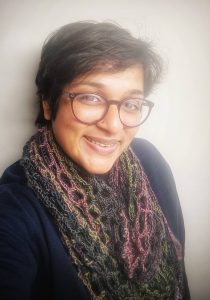 Lekshmi is a PhD student from India. She completed her Bachelor’s and Master’s degrees in Mechanical Engineering from the University of Kerala, with a specialisation in Machine Design. She had been teaching and working in scientific publishing before she joined the University of Otago as a PhD candidate earlier this year. Lekshmi joined He Honoka Hauwai as one of five excellent students to be awarded a PhD scholarship from our jointly funded German (Federal Ministry of Education and Research)-New Zealand (Ministry of Business, Innovation and Employment) research grant on “Safe, low-cost, hydrogen storage materials from NZ resources”.
Lekshmi is a PhD student from India. She completed her Bachelor’s and Master’s degrees in Mechanical Engineering from the University of Kerala, with a specialisation in Machine Design. She had been teaching and working in scientific publishing before she joined the University of Otago as a PhD candidate earlier this year. Lekshmi joined He Honoka Hauwai as one of five excellent students to be awarded a PhD scholarship from our jointly funded German (Federal Ministry of Education and Research)-New Zealand (Ministry of Business, Innovation and Employment) research grant on “Safe, low-cost, hydrogen storage materials from NZ resources”.
Lekshmi is enrolled as a PhD student at the University of Otago and is co-supervised by A/Prof Anna Garden (Otago, New Zealand) and Dr Paul Jerabek (Helmholtz-Zentrum Hereon, Germany). Her research focusses on the computational modelling of solid-state hydrogen storage materials. While Lekshmi is currently based in the Department of Chemistry at the University of Otago in Dunedin, she will be also spend some time working at Helmholtz-Zentrum Hereon during her PhD.
Lekshmi’s LinkedIn
Mohammad Zarar Rasheed
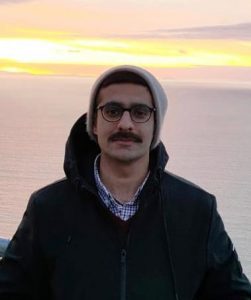 Zarar studied materials engineering (with a specialization in manufacturing) from Ghulam Ishaq Khan Institute of Engineering Sciences and Technology, Pakistan. His final year project was on the synthesis and fabrication of Titanium-Nickel shape memory alloys. He has a master’s degree in industrial technology from University of Science and Technology in South Korea where he was involved in developing an environmentally friendly technology for the recycling of rare earth elements from magnets by a pyrometallurgical technique.
Zarar studied materials engineering (with a specialization in manufacturing) from Ghulam Ishaq Khan Institute of Engineering Sciences and Technology, Pakistan. His final year project was on the synthesis and fabrication of Titanium-Nickel shape memory alloys. He has a master’s degree in industrial technology from University of Science and Technology in South Korea where he was involved in developing an environmentally friendly technology for the recycling of rare earth elements from magnets by a pyrometallurgical technique.
He holds over 5 years of professional experience in multi-disciplinary environments, of which 3 years are in the energy sector. Besides that, he has served in the International Standardization Organization’s Technical Committee 298 for element recycling where he contributed towards the development of 3 ISO standards for promoting recycling. His interests include clean energy, sustainability, and circular economy.
He has now joined He Honoka Hauwai | German-NZ Green Hydrogen Centre as one of the outstanding candidates who were awarded a PhD scholarship from our jointly funded German (Federal Ministry of Education and Research (BMBF))-New Zealand (Ministry of Business, Innovation and Employment (MBIE)) research grant on “Safe, low-cost, hydrogen storage materials from NZ resources”.
Zarar is enrolled as a PhD student at the Victoria University of Wellington, New Zealand, and is co-supervised by Prof. Chris Bumby (Paihau–Robinson Research Institute, Wellington, New Zealand), Prof. Peng Cao (University of Auckland, New Zealand) and Dr Claudio Pistidda (Helmholtz-Zentrum Hereon). His work in our project is to synthesize TiFe alloy from NZ mineral sources for hydrogen storage applications.
Zarar’s LinkedIn
Al-Hasan Abdulwahid
 Al-Hasan is a PhD candidate from Yemen. He completed his bachelor’s degree in Mechanical Power Engineering at Cairo University, Egypt, then after working for a time as a mechanical engineer, he went on to complete his MSc in Energy and Power Engineering at Shandong University, China. He has now joined He Honoka Hauwai | German-NZ Green Hydrogen Centre as one of five outstanding students who were awarded a PhD scholarship from our jointly funded German (Federal Ministry of Education and Research (BMBF))-New Zealand (Ministry of Business, Innovation and Employment (MBIE)) research grant on “Safe, low-cost, hydrogen storage materials from NZ resources”.
Al-Hasan is a PhD candidate from Yemen. He completed his bachelor’s degree in Mechanical Power Engineering at Cairo University, Egypt, then after working for a time as a mechanical engineer, he went on to complete his MSc in Energy and Power Engineering at Shandong University, China. He has now joined He Honoka Hauwai | German-NZ Green Hydrogen Centre as one of five outstanding students who were awarded a PhD scholarship from our jointly funded German (Federal Ministry of Education and Research (BMBF))-New Zealand (Ministry of Business, Innovation and Employment (MBIE)) research grant on “Safe, low-cost, hydrogen storage materials from NZ resources”.
Al-Hasan is enrolled as a PhD student at the University of Otago, based in the Department of Physics in Dunedin, co-supervised by A/Prof Michael Jack (Physics, Otago, New Zealand) and A/Prof Jonathan Leaver (Engineering, Unitec | Te Pūkenga, New Zealand). His work focuses on modelling hydrogen’s potential roles in New Zealand’s energy system using a ‘system dynamics model’, which should help to account for NZ’s unique characteristics like our geography, renewable resources, and energy use patterns.
Al-Hasan’s LinkedIn
Matthieu Ramond
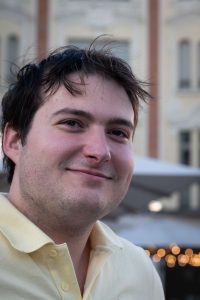 Matthieu is a 24-year-old PhD student from Istres, France. He prepared for the national engineering school entrance exam by studying physics, mathematics and chemistry at the Lycée du Parc, Lyon, France. He then entered the European School of Chemistry, Polymers and Materials (ECPM), Strasbourg, France, where he obtained an engineering degree and a master’s degree in materials and nanomaterials engineering. He worked on hydrogen production from seawater at IMN Jean Rouxel, Nantes, France, and on the ageing of catalysts at Bosch GmbH, Feuerbach, Germany.
Matthieu is a 24-year-old PhD student from Istres, France. He prepared for the national engineering school entrance exam by studying physics, mathematics and chemistry at the Lycée du Parc, Lyon, France. He then entered the European School of Chemistry, Polymers and Materials (ECPM), Strasbourg, France, where he obtained an engineering degree and a master’s degree in materials and nanomaterials engineering. He worked on hydrogen production from seawater at IMN Jean Rouxel, Nantes, France, and on the ageing of catalysts at Bosch GmbH, Feuerbach, Germany.
Matthieu has joined He Honoka Hauwai (German-New Zealand Green Hydrogen Alliance) as one of the excellent students awarded a PhD scholarship from the jointly funded New Zealand (Ministry of Business, Innovation and Employment (MBIE))–Germany (Federal Ministry of Education and Research (BMBF)) research grant on “Safe, low-cost, hydrogen storage materials from NZ resources”.
Matthieu is enrolled as a PhD candidate at the University of Otago and is co-supervised by Dr Claudio Pistidda (Helmholtz-Zentrum Hereon, Germany) and A/Prof Nigel Lucas (University of Otago, New Zealand). His work in our project is to examine the potential of TiFe-alloys derived from raw materials obtained in NZ as hydrogen storage materials. Matthieu is currently based at the Institute of Hydrogen Technology (Hereon) in Geesthacht (near Hamburg), where he is learning cutting-edge techniques to analyse hydrogen storage materials, like using a Sieverts apparatus to measure hydrogen uptake and desorption. He will then bring these skills and techniques to the Department of Chemistry at the University of Otago, where he’ll carry out the next two years of his PhD research.
Investigating ways of producing low-cost green hydrogen
PostDocs
Dr Chang Wu
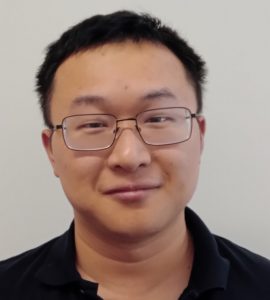 Chang is a postdoc from China in the Department of Chemical and Process Engineering at the University of Canterbury. His research is funded by a joint NZ-German MBIE/BMBF project investigating advanced catalysts for the Oxygen Evolution Reaction in Anion Exchange Membrane Electrolysers (AEMWE), which is led by Prof Aaron Marshall (University of Canterbury). Chang’s research involves collaborators from Germany, Prof Christina Roth (Universität Bayreuth) and Drs Christian Bernäcker and Clemens Kubeil (Fraunhofer IFAM), as well as from around NZ, Prof Geoff Waterhouse (University of Auckland), Dr Kim McKelvey (Victoria University of Wellington), and Prof Daniel Holland (University of Canterbury). Chang received his PhD (Advanced electrodes for metal-O2 batteries) from the Institute for Superconducting and Electronic Materials (ISEM), University of Wollongong in Australia. His research interest primarily lies on nanomaterials fabrication, water splitting, synchrotron techniques and electrochemistry.
Chang is a postdoc from China in the Department of Chemical and Process Engineering at the University of Canterbury. His research is funded by a joint NZ-German MBIE/BMBF project investigating advanced catalysts for the Oxygen Evolution Reaction in Anion Exchange Membrane Electrolysers (AEMWE), which is led by Prof Aaron Marshall (University of Canterbury). Chang’s research involves collaborators from Germany, Prof Christina Roth (Universität Bayreuth) and Drs Christian Bernäcker and Clemens Kubeil (Fraunhofer IFAM), as well as from around NZ, Prof Geoff Waterhouse (University of Auckland), Dr Kim McKelvey (Victoria University of Wellington), and Prof Daniel Holland (University of Canterbury). Chang received his PhD (Advanced electrodes for metal-O2 batteries) from the Institute for Superconducting and Electronic Materials (ISEM), University of Wollongong in Australia. His research interest primarily lies on nanomaterials fabrication, water splitting, synchrotron techniques and electrochemistry.
Chang’s LinkedIn
Dr Shailendra Sharma
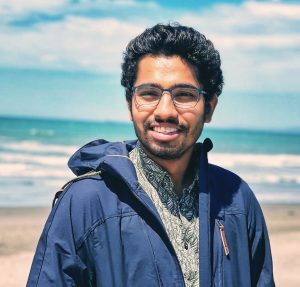 Shailendra hails from Rajasthan, India and obtained an undergraduate degree in Chemical Engineering from the Indian Institute of Technology (IIT) Roorkee. He completed his PhD at the University of Canterbury, New Zealand, under the supervision of A/Prof Vladimir Golovko and Prof Aaron Marshall, where he investigated the electrochemical reduction of CO2 using ultra-small Au clusters. After that, he joined the Marshall Group as a postdoctoral fellow, where he is working on the development of efficient water electrolysers.
Shailendra hails from Rajasthan, India and obtained an undergraduate degree in Chemical Engineering from the Indian Institute of Technology (IIT) Roorkee. He completed his PhD at the University of Canterbury, New Zealand, under the supervision of A/Prof Vladimir Golovko and Prof Aaron Marshall, where he investigated the electrochemical reduction of CO2 using ultra-small Au clusters. After that, he joined the Marshall Group as a postdoctoral fellow, where he is working on the development of efficient water electrolysers.
Shailendra’s research is funded by a joint German-NZ BMBF/MBIE grant and involves a range of collaborators from both Germany and around New Zealand, including Dr Kim McKelvey (Victoria University of Wellington), Drs Christian Bernäcker and Clemens Kubeil (Fraunhofer IFAM), Prof Daniel Holland (University of Canterbury), Prof Geoff Waterhouse (University of Auckland), and Prof Christina Roth (Universität Bayreuth). His area of research is “catalyst design and understanding the role of porous electrodes and transport layers in electrolysis systems”.
Shailendra’s LinkedIn
PhD Students
Laura Titheridge
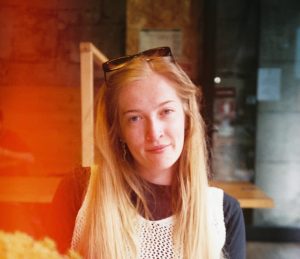 Laura is a 25-year-old PhD student from Conwy, North Wales. She completed her master’s degree in chemical engineering from the University of Birmingham, with a industrial placement year with Air Products between her third-year and masters year. Laura is one of our outstanding students to receive a PhD scholarship from our joint funded research grant between New Zealand (Ministry of Business, Innovation and Employment (MBIE)) and Germany (Federal Ministry of Education and Research (BMBF)), and to join He Honoka Hauwai (German-New Zealand Green Hydrogen Alliance). The project on “Development of highly active anodes for anion exchange membrane water electrolysers to enable low-cost green hydrogen” will produce new electrodes to increase the hydrogen production rates (to lower CAPEX) and improve hydrogen production efficiency (to lower OPEX). This can be achieved through the combined expertise of the NZ and German teams, who together have experience working with advanced catalytic materials, water electrolysis design and construction, and cutting-edge materials analysis.
Laura is a 25-year-old PhD student from Conwy, North Wales. She completed her master’s degree in chemical engineering from the University of Birmingham, with a industrial placement year with Air Products between her third-year and masters year. Laura is one of our outstanding students to receive a PhD scholarship from our joint funded research grant between New Zealand (Ministry of Business, Innovation and Employment (MBIE)) and Germany (Federal Ministry of Education and Research (BMBF)), and to join He Honoka Hauwai (German-New Zealand Green Hydrogen Alliance). The project on “Development of highly active anodes for anion exchange membrane water electrolysers to enable low-cost green hydrogen” will produce new electrodes to increase the hydrogen production rates (to lower CAPEX) and improve hydrogen production efficiency (to lower OPEX). This can be achieved through the combined expertise of the NZ and German teams, who together have experience working with advanced catalytic materials, water electrolysis design and construction, and cutting-edge materials analysis.
Laura is enrolled as a PhD candidate at the University of Canterbury, and is co-supervised by Prof Aaron Marshall (University of Canterbury, New Zealand) and Dr Kim McKelvey (Victoria University of Wellington, New Zealand). Her work focuses on enhancing the efficiency and stability of anion exchange membrane water electrolysers through catalyst development and the optimisation of membrane-electrode assembly fabrication techniques.

